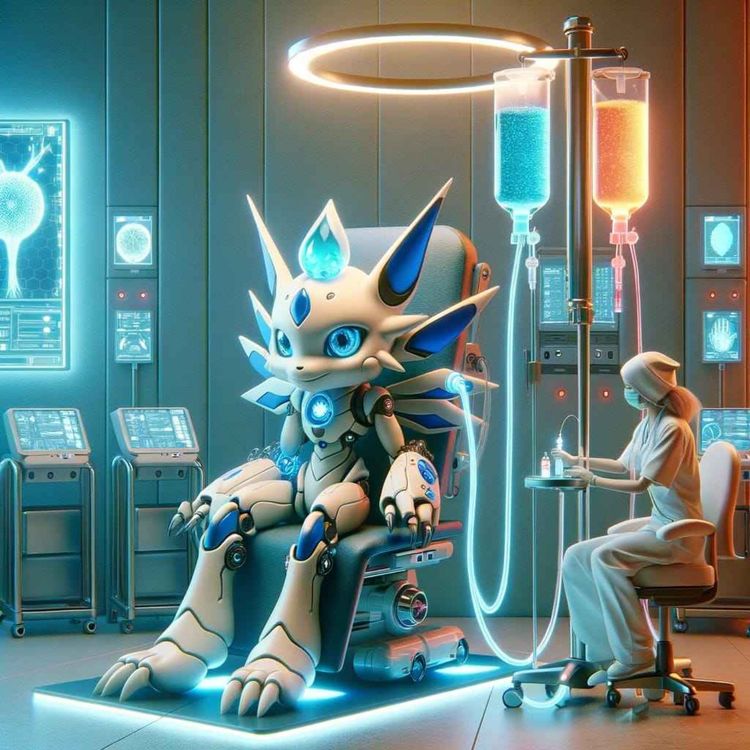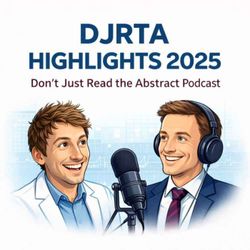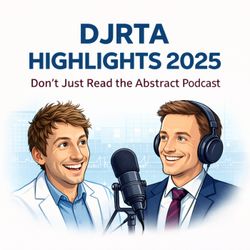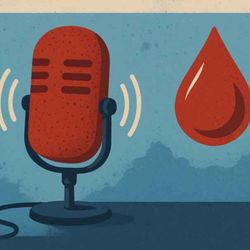Share

Don't Just Read the Abstract
Efgartigimod for ITP
In this episode, Pip and Rich discuss the ADVANCE IV trial: Efficacy and safety of the neonatal Fc receptor inhibitor efgartigimod in adults with primary immune thrombocytopenia: a multicentre, randomised, placebo-controlled, phase 3 trial.
With the help of Professor of Immunohaematology, Prof. Nikki Cooper, Rich and Pip dissect the trial, learning loads about ITP and the difficulties of doing trials in this space.
Links
HaemSTAR is an independent UK-wide network of registrars in clinical haematology, interested in promoting and performing research in classical haematology. Our focus is on collaborative projects across haemostasis & thrombosis, transfusion, general haematology, and obstetric haematology.
This episode was sponsored by Sobi as a hands-off educational grant. Sobi had no editorial input whatsoever.
More episodes
View all episodes

Ianalumab for ITP: VAYHIT2
01:02:56|On this episode, Pip and Rich VAY-HIT2, a trial recently published in the New England Journal of Medicine. This study randomised patients with relapsed/refractory ITP after first line corticosteroids to eltrombopag + ianalumab or placebo. As the thrombopoietin receptor agonists such as eltrombopag are often given for extensive periods, there's a lot of interest in giving additional treatment that can result in a relatively short course of treatment. Ianalumab is an anti-B-Cell Activating Factor (BAFF) Receptor monoclonal antibody. VAY-HIT2 was a phase 3, randomised, double-blind trial, assigning, in a 1:1:1 ratio, adults with primary ITP and an insufficient response or a relapse after first-line glucocorticoid therapy to receive eltrombopag + ianalumab at a dose of 9 mg or 3 mg per kilogram of body weight or placebo once monthly for 4 months. The trial did meet its primary endpoint but there's a lot to discuss, most importantly the quality of life end points - and the interpretation is not straight forward!Conflict of interest disclosure here: Pip has received travel expenses and payment for attending an advisory board for Novartis. Pip is also leading a Novartis-sponsored UK audit of the treatment of warm autoimmune haemolytic anaemia on behalf of HaemSTAR (www.haemstar.org/TRUTH).
28. Highlights of 2025 (Episode 2)
51:45||Season 1, Ep. 28In this second of a two-part episode, Pip and Rich discuss their highlights of 2025. They discuss a wide range of developments across medical haematology with a focus on red cells disorders and a bit less naval gazing than the first episode.
27. Highlights of 2025 (Episode 1)
56:20||Season 1, Ep. 27In this first of a two-part episode, Pip and Rich discuss their highlights of 2025. They discuss a wide range of developments across medical haematology with a focus on bleeding disorders and immuno-haematology.
26. Does anyone care about idiopathic and secondary polycythaemia? We do!
01:00:19||Season 1, Ep. 26On this episode, Pip and Rich discuss two of their recent publications on idiopathic and secondary polycythaemia. The first is an audit across two large hospitals in the Midlands. The team screened over 2000 patients who had had a JAK2 mutation screen performed, eventually finding 266 with confirmed idiopathic or secondary polycythaemia. By the time patients were seen, the haematocrit was already dropping. 60% were never venesected and venesection seemed to make no difference to haematocrits and had no association with thrombotic events. In the second paper which was a survey of clinicans, practice was, as expected, shown to be variable. 85% responded to say that they would be willing to randomise patients to a clinical trial of venesection vs no venesection.This is an interesting discussion on a common situation for which there is almost no academic interest whatsoever. However, it is a big clinical problem - there is a lot of work for haematologists here. The evidence does not support treating this group of patients in any way shape or form and a trial to prove non-inferiority of no venesection is very much needed.Here are the links to the papers: Maybury et al. Venesection and resolution of erythrocytosis are not associated with reduced thrombotic risk in secondary and idiopathic polycythaemia: Results from a dual centre, 5-year retrospective study. Br J Haematol . 2025 Sep;207(3):1127-1132. doi: 10.1111/bjh.20235Nicolson et al. Common Themes and Uncertainties in Management of Secondary Polycythaemia: An International Clinician Survey of Practice. EJHaem . 2025 Oct 27;6(6):e70171. doi: 10.1002/jha2.70171
25. Rebalancing haemostasis with marstacimab - an discussion about the BASIS trial
01:05:56||Season 1, Ep. 25On this episode, Pip and Rich discuss the BASIS trial which investigated the efficacy of the rebalancing agent marstacimab in people living with haemophilia. Marstacimab is an inhibitor of tissue factor pathway inhibitor (TFPI) and works by tipping the balance of clotting towards coagulation and away from bleeding. The trial showed that marstacimab works but is not randomised and there are some very interesting critical appraisal points in here even if you are not hugely interested in haemophilia.Matino et al. Marstacimab prophylaxis in hemophilia A/B without inhibitors: results from the phase 3 BASIS trial. Blood (2025) 146 (14): 1654–1663.Want a free monthly newsletter on medical haematology? Sign up at www.dontjustreadtheabstract.com.
24. BSH President Dr Sue Pavord: An Interview
01:02:56||Season 1, Ep. 24In this episode, Pip and Rich chat to Dr Sue Pavord, current President of the British Society of Haematology. Over the last 18 months Dr Pavord has led from the front with serious work on defining liaison haematology, paving the way for this to be formally incorporated into haematologists' job plans. They also discuss Dr Pavord's pivotal role as a clinical leader in the UK's response to Vaccine Induced Immune Thrombosis with Thrombocytopenia (VITT). Her insight into medicine, politics, and strategy are invaluable and this is a wide ranging interview. Give it a listen, and give it a like! You can read the recent publication on Liaison Haematology, recently published in BMJ Open, here.
DJRTA Newsletter #2
04:08|Pip and Rich preview their second Don't Just Read the Abstract newsletter. This week, the newsletter focuses on the work that the British Society for Haematology have being doing on workforce planning and liaison haematology in particular. If you would like to read Dr Sue Pavord's BSH message you can find it here.The paper we mention: Ransome et al. Defining ‘liaison haematology’ in the UK: a modified Delphi study. BMJ Open. 2025. To receive the newsletter, go to www.dontjustreadtheabstract.com and sign up. You can also access the newsletter on the website.
23. Intervention for Intermediate-High Risk PE
01:05:35||Season 1, Ep. 23When Dr Peter Douglas listened to our episode on the PEERLESS trial (S1, Ep12), he began to develop a funny sensation in his chest.Emailing us he wrote:"Your commentary on this paper lead me to develop the signs and symptoms of submassive PE. I am an interventional radiologist who has spent the last 3-4 years setting up a PERT and catheter based therapy service for PE and would love to speak to you further about this. In a nutshell... you missed the point. But the point is not something the authors or sponsoring company were trying to prove, so you won't find it in the results section."Happily, he was joking (sort of), but it did make us want to get him on and ask him all about something we have limited personal experience of. So, we did!
Introducing the DJRTA Newsletter
04:15|In this 5 minute episode, Pip and Rich introduce the brand new Don't Just Read the Abstract Newsletter, a twice monthly update on all things medical haematology. Covering latest developments and publications in haemostasis, thrombosis, transfusion, immunohaematology, and red cell haematology, the newsletter will keep you up-to-date on what matters to patients.Sign up at www.dontjustreadtheabstract.com.